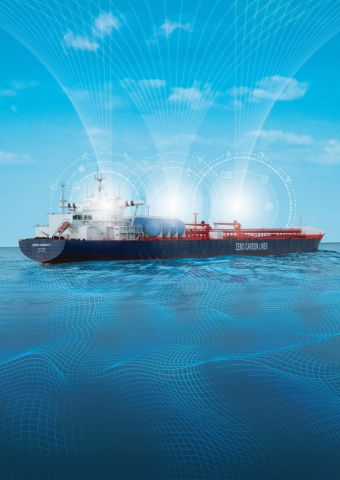ABS onthult de nieuwste trends en projecties voor toekomstige brandstoffen en decarbonisatie
Koolstofarme verzendvooruitzichten suggereert dat de industrie meer moet doen om de BKG-doelstellingen te halen
HOUSTON– (BUSINESS WIRE) – ABS heeft de laatste trends en prognoses gepubliceerd over strategieën voor koolstofvermindering voor de scheepvaart, aangezien de industrie ernaar streeft om de koolstofarme ambities waar te maken.
De koers bepalen naar koolstofarme scheepvaart onderzoekt nieuwe brandstoffen, technologieën en operationele maatregelen en stemt die af op prognoses voor de belangrijkste handelsroutes ter wereld om voor te stellen hoe scheepvaart er in 2030 en 2050 uit kan zien.
De tweede van twee ‘Outlook’-documenten – de eerste werd gepubliceerd in juni 2019 – het past toe wat ABS op dit moment weet over bestaande en toekomstige brandstoffen om te projecteren welke energiebron het meest geschikt is voor elke handelsbaan en wat dat kan betekenen voor het ontwerp van de schepen die ze bedienen.
“Maritieme koolstofarme uitdaging kan worden beschouwd als een complex raadsel met drie elementen: energie-efficiënte technologieën voor schepen, operationele optimalisatie en koolstofarme of koolstofneutrale brandstoffen zonder en met nul. Alle elementen spelen een rol, maar we hebben vastgesteld dat het tempo van de transitie van de scheepvaart naar koolstofarmere brandstoffen de grootste impact zal hebben op haar wereldwijde ecologische voetafdruk; meer dan enige voorspelbare verschuivingen in de vraag naar grondstoffen, verbeteringen in de bedrijfsvoering, scheepsroutering of scheepsontwerpen ”, aldus Christopher J. Wiernicki, ABS-voorzitter, president en chief executive officer. “De modellen in ons onderzoek suggereren dat onze industrie de doelstellingen voor de vermindering van de koolstofintensiteit tegen 2050 zal halen, maar het zou de doelstelling voor de totale jaarlijkse uitstoot van broeikasgassen misschien niet halen. Kortom, er is een kloof tussen de huidige koers van de industrie en de verklaarde ambitie. ”
ABS Unveils Latest Trends and Projections for Future Fuels and Decarbonization
Low Carbon Shipping Outlook Suggests Industry Will Need to Do More to Meet GHG Targets
HOUSTON–(BUSINESS WIRE)– ABS has published the latest trends and projections on carbon-reduction strategies for shipping as the industry looks to meet decarbonization ambitions.
This press release features multimedia. View the full release here: https://www.businesswire.com/news/home/20200416005056/en/

An artist’s impression of a next generation, low carbon tanker. (Graphic: Business Wire)
Setting the Course to Low Carbon Shipping examines new fuels, technologies and operational measures and matches that with forecasts for the world’s key trade lanes to envision what shipping may look like in 2030 and 2050.
The second of two ‘Outlook’ documents – the first was published in June 2019 – it applies what ABS currently knows about existing and future fuels to project which energy source could be best suited for each trade lane and what that may mean for the design of the vessels working them.
“Maritime’s decarbonization challenge can be regarded as a complex riddle with three elements: vessel energy efficient technologies, operational optimization and low and zero carbon or carbon neutral fuels. All elements have a role to play, but we have identified that the rate of shipping’s transition to lower carbon fuels will have the single biggest impact on its global carbon footprint; more than any predictable shifts in commodity demand, enhancements to operating practices, vessel routings, or ship designs,” said Christopher J. Wiernicki, ABS Chairman, President and Chief Executive Officer. “The models in our research suggest our industry will meet the targets for the reduction in carbon intensity by 2050, but it might miss the target for the total GHG emitted annually. In short, there is a gap between the industry’s present course, and its stated ambition.”
The Outlook’s approach was supported by Maersk.
Palle B. Laursen, Maersk Chief Technical Officer, said: “In Maersk, we have for more than a decade been industry leaders in CO2 efficiency, and we have set ourselves the bold target of becoming carbon neutral by 2050. To bring this ambition to life, we need to bring the first commercially viable carbon neutral vessel into operation by 2030 already, which can only happen if we work together across the industry and supply chain, which is why the research from ABS on decarbonization pathways and what shipping may look like in the future is well timed. The study is thorough and comprehensive, and links the task ahead with practical steps of implementation.”
ABS collaborated with Maritime Strategies International (MSI) to create a global scenario for the future CO2 emissions from shipping, which takes into account the future variation of fuels used in vessels, as well as the decarbonization of different industrial sectors on which shipping depends. ABS also worked with Herbert Engineering Corp. (HEC) to develop a series of tanker, bulk carrier and container ship design concepts to explore practical options for meeting IMO greenhouse gas goals.
Research in the Outlook suggests that, on the current trajectory, petroleum-based fuels will still have considerable market share by 2050, which has significant implications for meeting the emissions challenge.
To hear more from ABS sustainability experts on carbon reduction strategies for shipping, register for our upcoming webinar here.
Download a copy of Setting the Course to Low Carbon Shipping here.
About ABS
ABS, a leading global provider of classification and technical advisory services to the marine and offshore industries, is committed to setting standards for safety and excellence in design and construction. Focused on safe and practical application of advanced technologies and digital solutions, ABS works with industry and clients to develop accurate and cost-effective compliance, optimized performance and operational efficiency for marine and offshore assets.
View source version on businesswire.com: https://www.businesswire.com/news/home/20200416005056/en/
Contacts
ABS Media Relations
Gareth Lewis
